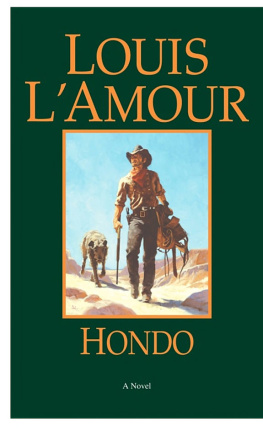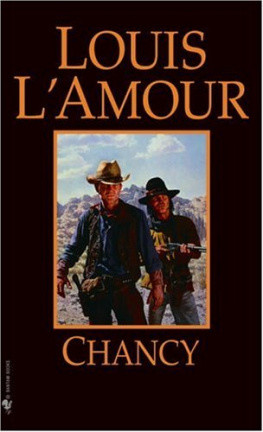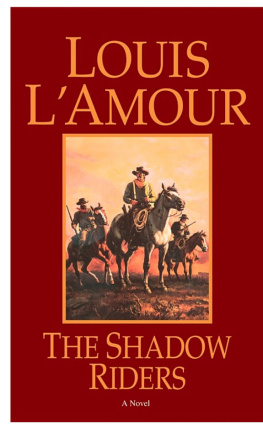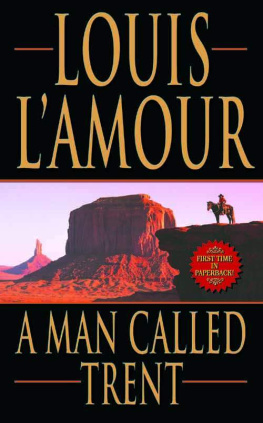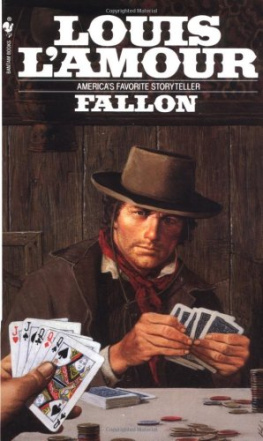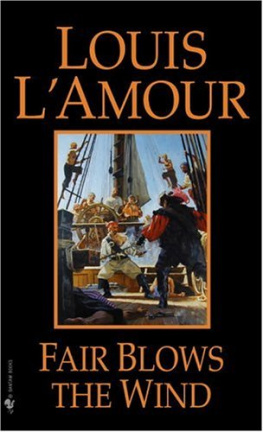Louis LAmour - Yondering
Here you can read online Louis LAmour - Yondering full text of the book (entire story) in english for free. Download pdf and epub, get meaning, cover and reviews about this ebook. year: 2004, publisher: Bantam, genre: Detective and thriller. Description of the work, (preface) as well as reviews are available. Best literature library LitArk.com created for fans of good reading and offers a wide selection of genres:
Romance novel
Science fiction
Adventure
Detective
Science
History
Home and family
Prose
Art
Politics
Computer
Non-fiction
Religion
Business
Children
Humor
Choose a favorite category and find really read worthwhile books. Enjoy immersion in the world of imagination, feel the emotions of the characters or learn something new for yourself, make an fascinating discovery.

- Book:Yondering
- Author:
- Publisher:Bantam
- Genre:
- Year:2004
- Rating:4 / 5
- Favourites:Add to favourites
- Your mark:
- 80
- 1
- 2
- 3
- 4
- 5
Yondering: summary, description and annotation
We offer to read an annotation, description, summary or preface (depends on what the author of the book "Yondering" wrote himself). If you haven't found the necessary information about the book — write in the comments, we will try to find it.
Yondering — read online for free the complete book (whole text) full work
Below is the text of the book, divided by pages. System saving the place of the last page read, allows you to conveniently read the book "Yondering" online for free, without having to search again every time where you left off. Put a bookmark, and you can go to the page where you finished reading at any time.
Font size:
Interval:
Bookmark:

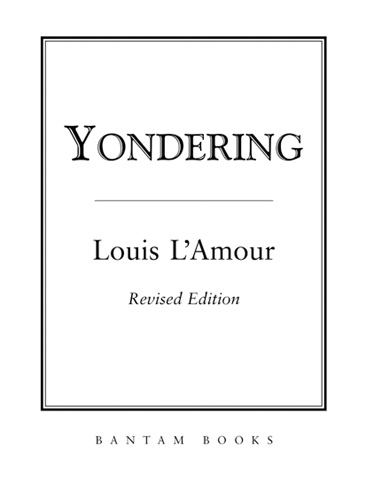
Contents
D eadly V oyage
H E WAS HALF asleep when they suddenly closed in on him. At one moment he had been thinking of what hed heard about them, and he must have dozed off, for they closed in quickly and silently. Some faint sound of bare feet on the deck must have warned him.
He saw the gleam of starlight on steel, and he ripped up with his own knife. The man pulled back sharply, and his blade sliced open a shirt, and the tip of his knife drew a red line from navel to chin.
Then he was on his feet. Somebody struck at him with a marlin spike, and he parried the blow with his blade and lunged. The knife went in; he felt his knuckles come up hard against warm flesh, and he withdrew the knife as he dodged another blow at his head.
One feinted a rush. The man on deck was on his feet, and they were spreading out. The half light was confusing, and as he moved to get closer to one man, he heard another coming in from behind. He tried to make a quick half turn, but a belaying pin caught him alongside the skull. He fell against the rail. Then another blow caught him, and he felt himself falling.
He hit the water and went down.
From The Dancing Kate
To Marc Jaffe...
A good friend
and a fine gentleman
from New York
whom I met in a saloon
in Elko, Nevada.
Foreword to the Revised Edition
D URING THE MONTHS following my fathers death I began the job of cleaning up his office and trying to make sense out of all the papers that he had left behind. The room where Dad worked is roughly 25 15, and its twelve-foot walls are lined with book cases which, mounted on huge hinges, swing out to reveal even more books. His deska handcarved wooden table as big as a double bed, a coffee table, the hearth of the fireplace, and most of the floor were covered with precariously balanced piles of paper, magazines (Dad subscribed to more than twenty), reference books and artifacts (everything from an ancient Arabian dagger to a Minox camera smaller than a cigarette lighter). It was a magnificent mess. When Dad was alive he would tell us that, bad as it looked, he knew where everything in the room wascertainly when he needed to find something he always could. I used to joke with him that the trick to locating anything in this room was not so much knowing where it was, as knowing what it was under.
It took weeks to do the first sorting of all this material. I separated out boxes of notes, clippings of news items he had been interested in, and piles of fan mail. I remember, back when I used to live with my parents, Dad would get a stack of letters two or three inches thick every week, all of it from readers. I can tell you now, while he only answered a portion of them, he kept every one. I filled twenty-two file boxes with correspondence. I also found some stories
The first several manuscripts that I came upon turned out to be novels that have already been published. (It was hard to tell at first because many of the copies that Dad kept didnt have a title page.) But then, hidden away in a closet behind one of his file cabinets, I found several dusty boxes of unpublished stories.
After I had cleaned up most of the room, my mother and I sat down at the big table and began to examine those manuscripts. There were outlines and treatments, some articles, two novels, and quite a few short stories. We placed them in piles according to genre: westerns, crime stories, adventures, and sports. Among these stories we found a few that had a different tone than the rest. They were about people and events from my fathers own life rather than fictional adventures. I felt that to include them in an upcoming book of mysteries or westerns would be wrongthey belonged in YONDERING.
Bantam had plans to reissue the book and so I asked for this new material to be incorporated in it. By the Ruins of El Walarieh is now the third story with And Proudly Die and Show Me the Way to Go Home the eighth and ninth. The last story, The Moon of the Trees Broken by Snow, which never really belonged in this book, has been replaced by So You Want Adventure, Do You?, an article that Dad wrote while he was in Europe during World War II.
I hope you enjoy these new selections.
B EAU L A MOUR
Introduction
I N THE BEGINNING there was a dream, a young boys dream, a dream of far lands to see, of oceans to cross, and somewhere at the trails end, a girl. The girl.
More than all else I wanted to tell stories, stories that people could read or hear, stories to love and remember. I had no desire to write to please those who make it their business to comment but for the people who do the work of the world, who live on the land or love the land, people who make and bake and struggle to make ends meet, for the people who invent, who design, who build, for the people who do. And if somewhere down the line a man or woman can put a finger on a line and say, Yes, that is the way it was. I was there, then I would be amply repaid.
I have never scoffed at sentiment. Cynicism is ever the outward face of emptiness.
What, after all, is romance? It is the music of those who make the world turn, the people who make things happen. Romance is the story of dreams that could come true and so often do.
Why do men ride the range? Go to sea? Explore the polar icecaps? Why do they ride rockets to unknown worlds? It is because of romance, because of the stories they have read and the stories they have dreamed.
Some have said this is the age of the nonhero, that the day of the hero is gone. Thats nonsense. When the hero is gone, man himself will be gone, for the hero is our future, our destiny.
These are some of the stories of a writer trying to find his way, trying to find the truth of what he has seen, to understand the people, to learn a little more about telling a story.
The people whom I have met and with whom I worked in those earlier years were not always nice people, but each in his own way was strong, or he could not survive. Of course, there were some who did not, some who could not survive. For one reason or another, nature weeded them out and cast them aside, just as happened on our frontier during the westward movement.
Some of these stories are from my own life; some are from the lives of people I met along the way.
Somewhere my love lay sleeping
Behind the lights of a far-off town;
So I gave my heart to a bend in the road,
And off I went, a-yondering.
W HERE T HERES F IGHTING
In the passing of time when greater events occupy the attention of the world, some things are forgotten that should be remembered. The following story is just one tiny tribute to many gallant men, both British and Greek, who attempted to stay, if just for a little while, what was at the time an invincible tide.
On about April 6, 1941 Germany invaded Greece as one small fragment of a much larger pattern. Anticipating such a move, Great Britain had landed 57,000 men under Gen. Maitland Wilson. Moving with speed and efficiency, the German armored divisions struck south and between April twelfth and the twentieth German spearheads advanced through the rugged mountain terrain of central Greece.
Papagos, realizing victory was impossible, suggested he try to stay the advance long enough for the British forces to escape intact so they could fight elsewhere. His efforts were so successful that despite a German parachute drop near Corinth, some 43,000 British soldiers were evacuated. Many of these soldiers were with Alexander when he won his victory in North Africa
Next pageFont size:
Interval:
Bookmark:
Similar books «Yondering»
Look at similar books to Yondering. We have selected literature similar in name and meaning in the hope of providing readers with more options to find new, interesting, not yet read works.
Discussion, reviews of the book Yondering and just readers' own opinions. Leave your comments, write what you think about the work, its meaning or the main characters. Specify what exactly you liked and what you didn't like, and why you think so.

